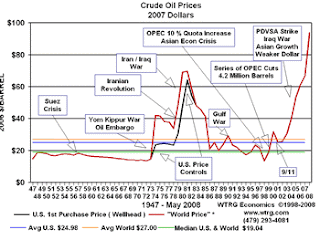
As you all know, oil prices have been falling like crazy from the heights of US$147 during april to US$34 this month. But, what is the bottom line? When will the bottom price surface up? No one knows. So, I believe that historical prices come into play. Throughout history, oil prices have gone up and down like a roller coaster. So, how do you know when to buy it? Why buy oil when there are so many other investments? What are the opportunity costs in buying oil?
I personally look at oil as there is a huge speculative element in it. Moreover, during the last economic boom, there shows a very strong direct correlation between the bull market and the prices of oil. Why prices of oil increase during strong economic growth? This is because of emerging countries like India and China needing these energy resources to feed this phenomenal growth. Coupled with this rise in demand, there is also a fundamental fall in supply of oil reserves. Thus, the soaring demand(during a bull market) and ever fall in supply is bound to rocket the prices of oil up to new heights.
So, when do you buy it in order not to be caught on the wrong side of the roller coaster? I will show you a graph to illustrate the historical prices. However, the graph is not really updated but it still pretty much serves as a powerful reference. (The graph is on top. I tried to shift it down but I don't know why it refuses to come down.)
As you can see, the historical average is around the range of $US 30. WHAT!!!SO LOW??That is the reaction of most people if they have been hearing about the prices of oil. Yup, that is actually the historical average of oil prices. So, with the prices of oil now so close to the historical average, I feel that one must actually seize the opportunity, so that he/she will not miss it when the oil prices rocket up again.
So, what is the exit strategy if you have bought it? My exit strategy would be to sell according to the general p/e of the stock market around the world.(which is around the range of 18-20) Because, I feel that the next boom in oil prices will be due to the surging demand by the economic growth, particularly by countries like India and China.
However, there is one note to caution about making oil as part of your investment portfolio. This approach is a little speculative, so it really not advisable to allocate a huge portion of wealth to it. Who knows? Someday, explorers might disover huge oil reserves that can last the world to 2100(currently, experts believe that oil will run out by 2030, maybe even faster). So, maybe you can allocate just 10-20% to this approach.
Personally, I am a value investor-which means I buy low and sell high. With the low prices of so many companies and commodities lying around, how can one not resist?












